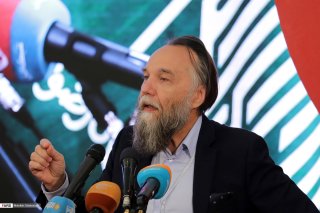Alexander Dugin is Not That Important
Intellectuals peddling big ideas are rarely in the driver’s seat of politics—especially in autocracies without freedom of expression. Dugin is no exception.
In fact, Primakov had been expounding a Eurasian outlook as early as 1992. Speaking to the Moscow Institute of International Relations, he said: “Russia is both Europe and Asia, and this geopolitical location continues to play a tremendous role in the formulation of its foreign policy. Its [interests] include China, India, and Japan, and not just the United States or Europe. They also include the Middle East and the ‘Third World.’ Without such geopolitical scope, Russia cannot continue to be a great power and to play the positive role it has been destined to play.”
Given that Soviet security officials had conducted multi-theater planning from Afghanistan to Poland throughout the Cold War, the reemergence of a “Eurasian” outlook in Russian security circles should be rather unsurprising. When books allege that Dugin’s ideological “Eurasianism began to creep into mainstream discourse” because “a new set of foreign policy guidelines issued in 2000 described Russia’s most important strength as its ‘geopolitical position as the largest Eurasian state,’” one might ask when such ideas were not part of mainstream discourse.
An Old and Dangerous Temptation
Alexander Dugin does not exercise exceptional political influence in Putin’s Russia. A cursory analysis of his career, his writing, and the ideas around him reveals that he is just one career courtier among thousands. He is no Rasputin, no silver bullet, but one piece in a much larger puzzle. In this respect, the extensive coverage of Dugin offers a general lesson. It is tempting to look to intellectuals to make sense of opaque autocracies. Their crisp ideas seem to cut through the fog of palace intrigue and false opinion. But the insight they offer is almost always illusory.
This is an old and dangerous temptation. Eighty years ago, in trying to explain the Second World War, U.S. media outlets identified the Nazi-affiliated intellectual Karl Haushofer as the architect of Hitler’s grand strategy. Commentators pointed to his alleged academic postings, his musings on world domination, and apparent echoes of his ideas as proof of his influence. But Haushofer never made it into Hitler’s inner circle. The entire line of analysis was misplaced. We now know that Hitler changed his behavior depending on the strategic environment that the Allies created.
What we really need to know today—and hopefully Western intelligence agencies already do—is what Putin’s policy process looks like. How does he take counsel? What will make him think twice? It is important to get these answers right. Only then can one begin to determine what concrete actions might change Russian behavior. Simply identifying Russia as a philosophical enemy does not get us closer to a coherent strategic vision. To respond forcefully and effectively to Putin’s invasion, we must not conflate exercises in intellectual history for strategic analysis.
Alex Hu is a student at Yale University. He can be reached at [email protected].
Image: Fars Media Corporation/Wikimedia Commons.

